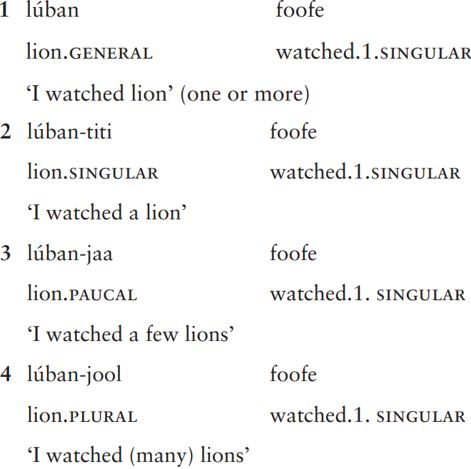


 Grammar
Grammar
 Tenses
Tenses
 Present
Present
 Past
Past
 Future
Future
 Parts Of Speech
Parts Of Speech
 Nouns
Nouns
 Verbs
Verbs
 Adverbs
Adverbs
 Adjectives
Adjectives
 Pronouns
Pronouns
 Pre Position
Pre Position
 Preposition by function
Preposition by function 
 Preposition by construction
Preposition by construction
 Conjunctions
Conjunctions
 Interjections
Interjections
 Grammar Rules
Grammar Rules
 Linguistics
Linguistics
 Semantics
Semantics
 Pragmatics
Pragmatics
 Reading Comprehension
Reading Comprehension|
Read More
Date: 2023-12-06
Date: 2023-08-04
Date: 18/11/2022
|
NUMBER
The category of number in English primarily affects nouns, and only minimally verbs (for example, in the was/were singular/ plural opposition for the verb to be), and has the values singular and plural, the latter as we have seen being generally marked by a suffix to a nominal stem. From an anglophone perspective, it is easy to assume that these are the only two relevant values, but number systems like that of English do not in fact represent the norm cross-linguistically.
A few languages, for example Pirahã (spoken by around 250 people in Amazonas, Brazil), are believed to have no category of number, while others have systems which mark not just singular and plural but singular, dual (inflection for two items), trial (for three) or paucal (a small number of items). The pronoun system of Sursurunga, a language spoken in New Ireland, Papua New Guinea, has a five-value system that distinguishes singular, dual, trial, quadral (for four items) and plural in its pronoun system:

The number category differs not only in the number of values expressed in different languages, but also in the way these values are expressed. In English, for example, nouns must generally be marked singular or plural, but in some languages there is an unspecified or general form which commits the speaker to no number value. In the Bayso language of Southern Ethiopia, for example, the base form of the noun is unmarked for number, and there are separate suffixes for singular, paucal and plural (2000: 11):

|
|
|
|
علامات بسيطة في جسدك قد تنذر بمرض "قاتل"
|
|
|
|
|
|
|
أول صور ثلاثية الأبعاد للغدة الزعترية البشرية
|
|
|
|
|
|
|
مكتبة أمّ البنين النسويّة تصدر العدد 212 من مجلّة رياض الزهراء (عليها السلام)
|
|
|